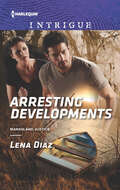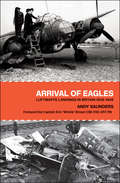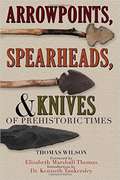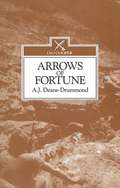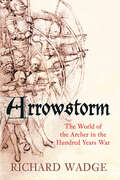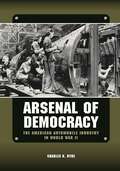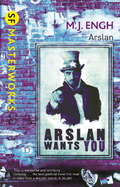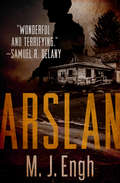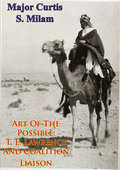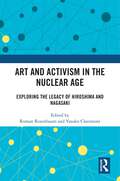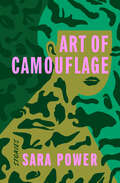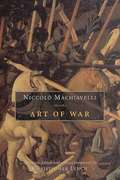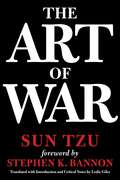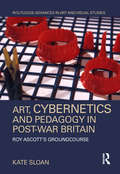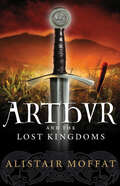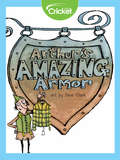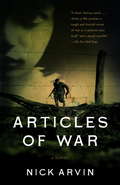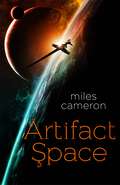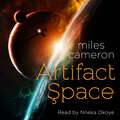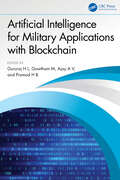- Table View
- List View
Arresting Developments: Smoky Mountain Setup Arresting Developments Trusting A Stranger (Marshland Justice #2)
by Lena DiazA mysterious beauty nurses an ex-Navy pilot back to health—and attracts the attention of some dangerous men in this romantic suspense thriller.Somewhere over the Everglades, the airplane’s engine failed and Dex Lassiter plummeted into the swamp’s murky depths. Amber Callahan didn’t expect to find any survivors in the wreckage, but Dex was about as tough as they came. And too smart not to dig into why a woman like her had run away to settle in remote Mystic Glades. Or why a killer circled their every move. As floodwaters rose, deputizing Dex was just what this lawless small town needed. Because escape wasn’t possible. And the only thing Dex did better than starting things was defending them.
Arrival of Eagles: Luftwaffe Landings in Britain 1939–1945
by Andy SaundersA fascinating look at German planes that wound up in British territory during World War II, with photos. During the Second World War, a great many Luftwaffe aircraft arrived in the United Kingdom or its coastal waters, but, as with the famous flight of Rudolf Hess, not all of them through &“conventional&” combat circumstances. Some got lost; others were brought by defectors; some were lured through electronic countermeasures by the RAF; and others were brought down in unusual circumstances. However they arrived, all manner of types appeared—He 111, Go 145, Me 110, Ju 88, Me 109 F and G, Fw 190, Do 217—and all were of great interest to the RAF. In some cases, aircraft were repaired and test flown, betraying vital and invaluable information. In Arrival of Eagles, an author of numerous books on military aviation examines a selection of such intriguing cases and draws upon his own research, interviews, official reports, and eyewitness accounts to bring alive these truly unusual accounts, all richly illustrated with photographs.
Arrowpoints, Spearheads, and Knives of Prehistoric Times
by Elizabeth Marshall Thomas Thomas Wilson Kenneth Barnett TankersleyA thorough history of the weapons and tools our prehistoric ancestors used to survive, this book reveals a world that will fascinate anyone interested in outdoor skills, ancient weapons, or anthropology. Thomas Wilson explains the many types of arrowheads, spears, and knives used by the peoples of the Paleolithic period across Western Europe and the early days of America. He details the materials from which these tools were made, how and where they were manufactured, and the purposes for which they were crafted—from hunting and cutting to scraping and grinding. Lavishly illustrated with hundreds of drawings of these tools, including microscopic details of the flint and other stones from which they were crafted, this is a rare look into what seems like mankind's not-so-distant past.
Arrows of Fortune
by A. J. Deane-DrummondIn this exciting memoir, a major-general in the British Army chronicles his life, service, and multiple escapes from captivity during World War II. Major-General Anthony Deane-Drummond was a famed escaper from the Germans in World War II. He first described his experiences in a book called Return Ticket. This is the full story of his life which is chiefly memorable for the story of his escape after the Battle of Arnhem.
Arrowstorm: The World of the Archer in the Hundred Years War
by Richard WadgeThis book chronicles the overwhelming importance of the military archer in the late medieval period. The longbow played a central role in the English victory at the battles of Crecy and Agincourt. Completely undermining the supremacy of heavy cavalry, the longbow forced a wholesale reassessment of battlefield tactics. Richard Wadge explains what made England's longbow archers so devastating, detailing the process by which their formidable armament was manufactured and the conditions that produced men capable of continually drawing a bow under a tension of 100 pounds. Uniquely, Wadge looks at the economics behind the supply of longbows to the English army and the social history of the military archer. Crucially, what were the advantages of joining the first professional standing army in England since the days of the Roman conquest? Was it the pay, the booty, or the glory? With its painstaking analysis of contemporary records, Arrowstorm paints a vivid portrait of the life of a professional soldier in the war which forged the English national consciousness.
Arsenal of Democracy: The American Automobile Industry in World War II
by Charles K. HydeThroughout World War II, Detroit's automobile manufacturers accounted for one-fifth of the dollar value of the nation's total war production, and this amazing output from "the arsenal of democracy" directly contributed to the allied victory. In fact, automobile makers achieved such production miracles that many of their methods were adopted by other defense industries, particularly the aircraft industry. In Arsenal of Democracy: The American Automobile Industry in World War II, award-winning historian Charles K. Hyde details the industry's transition to a wartime production powerhouse and some of its notable achievements along the way. Hyde examines several innovative cooperative relationships that developed between the executive branch of the federal government, U.S. military services, automobile industry leaders, auto industry suppliers, and the United Automobile Workers (UAW) union, which set up the industry to achieve production miracles. He goes on to examine the struggles and achievements of individual automakers during the war years in producing items like aircraft engines, aircraft components, and complete aircraft; tanks and other armored vehicles; jeeps, trucks, and amphibians; guns, shells, and bullets of all types; and a wide range of other weapons and war goods ranging from search lights to submarine nets and gyroscopes. Hyde also considers the important role played by previously underused workers-namely African Americans and women-in the war effort and their experiences on the line. Arsenal of Democracy includes an analysis of wartime production nationally, on the automotive industry level, by individual automakers, and at the single plant level. For this thorough history, Hyde has consulted previously overlooked records collected by the Automobile Manufacturers Association that are now housed in the National Automotive History Collection of the Detroit Public Library. Automotive historians, World War II scholars, and American history buffs will welcome the compelling look at wartime industry in Arsenal of Democracy.
Arsenals of Folly: The Making of the Nuclear Arms Race
by Richard RhodesPulitzer Prize-winning author Richard Rhodes delivers a riveting account of the nuclear arms race and the Cold War. In the Reagan-Gorbachev era, the United States and the Soviet Union came within minutes of nuclear war, until Gorbachev boldly launched a campaign to eliminate nuclear weapons, setting the stage for the 1986 Reykjavik summit and the incredible events that followed. In this thrilling, authoritative narrative, Richard Rhodes draws on personal interviews with both Soviet and U.S. participants and a wealth of new documentation to unravel the compelling, shocking story behind this monumental time in human history--its beginnings, its nearly chilling consequences, and its effects on global politics today.From the Trade Paperback edition.
Arslan
by M.J. EnghA classic of political science fictionArslan is a young Asian general who has conquered the USA and then the world, with a small town in Illinois as the capital of his new empire.Praised by the likes of Orson Scott Card and Samuel R. Delany, ARSLAN is a thoughtful but uncompromising work, one which still retains the power to shock.
Arslan (S. F. Masterworks Ser.)
by M. J. EnghA third world dictator conquers and rules a dystopian America in this &“wonderful and terrifying&” work of political science fiction (Samuel R. Delany). By the time General Arslan brings his army from Turkistan to America, he has already conquered the rest of the world, using strategy and craft rather than bullets and bloodshed. The modern-day Genghis Khan sets up headquarters in tiny Kraftsville, Illinois, and when he asserts his power by violently assaulting an eighth-grade girl and boy—onstage, before a cheering audience of his soldiers—the townspeople know that no one is safe. Forced to open his home to the despot, Franklin Bond, the school principal whose students were publicly violated, finds himself strangely drawn to the world&’s new master and privy to his quirks and mental machinations. In fact, only one other person in town will have a closer connection to Arslan during the long, hard era of his reign: Hunt Morgan, the boy the dictator brutalized before the entire town—and whom he now owns. But there is a secret side to the human monster that no one, not even Bond or Morgan, sees during these years of terror and enslavement. For Arslan has already set a grander scheme in motion: to save our world . . . by destroying it. Few works of speculative fiction have been held in higher regard—or provoked more outraged controversy—than M. J. Engh&’s classic science fiction tale of the conquest of America. Brilliant and disturbing, this thought-provoking and surprising novel is an intriguing character study, a dire warning that continues to pack a devastating punch, and &“without question one of the finest works of fiction of our generation&” (Orson Scott Card).
Arslan (S.F. MASTERWORKS)
by M.J. EnghA classic of political science fictionArslan is a young Asian general who has conquered the USA and then the world, with a small town in Illinois as the capital of his new empire.Praised by the likes of Orson Scott Card and Samuel R. Delany, ARSLAN is a thoughtful but uncompromising work, one which still retains the power to shock.
Art Of The Possible: T. E. Lawrence And Coalition Liaison [Illustrated Edition]
by Major Curtis S. MilamIncludes World War One In The Desert Illustration Pack- 115 photos/illustrations and 19 maps spanning the Desert campaigns 1914-1918.Coalition warfare has been, and will continue to be, a matter of course for the U.S. military. Developing and maintaining coalitions of politically and militarily diverse members is, at its most elemental level, a matter of human relationships--the person-to-person give and take that characterizes all human endeavor. It is often complex, inexact, and tedious, perhaps more art than science. The frustration encountered by policymakers and military professionals alike argues strongly for an earnest examination of the personal characteristics and professional principles used by successful coalition builders, liaisons, and advisors. This paper examines the contributions made by T.E. Lawrence to the art of coalition liaison during his service as the British advisor to the Arabs during World War I. Specifically, it identifies the personal characteristics that helped Lawrence work so effectively with the Arabs, as well as the professional principles that guided his actions as he helped form the coalition of Arab tribes and the alliance between those tribes and Britain.
Art and Activism in the Nuclear Age: Exploring the Legacy of Hiroshima and Nagasaki
by Yasuko Claremont Roman RosenbaumThis book explores the contemporary legacy of Hiroshima and Nagasaki following the passage of three quarters of a century, and the role of art and activism in maintaining a critical perspective on the dangers of the nuclear age. It closely interrogates the political and cultural shifts that have accompanied the transition to a nuclearised world. Beginning with the contemporary socio-political and cultural interpretations of the impact and legacy of the destruction of Hiroshima and Nagasaki, the chapters examine the challenges posed by committed opponents in the cultural and activist fields to the ongoing development of nuclear weapons and the expanding industrial uses of nuclear power. It explores how the aphorism that "all art is political" is borne out in the close relation between art and activism. This multi-disciplinary approach to the socio-political and cultural exploration of nuclear energy in relation to Hiroshima/Nagasaki via the arts will be of interest to students and scholars of peace and conflict studies, social political and cultural studies, fine arts, and art and aesthetic studies.
Art of Camouflage
by Sara PowerA powerful debut about the lives of women and girls caught in the orbit of the military.Female recruits weathering toxic masculine environments. Military wives stretched thin across countless military moves, new cities and new selves. Military kids whose mercurial friendships flare and fade to the rhythm of their parent's career path. Throughout, this collection introduces us to characters who trespass beyond the boundaries of their own realities to discover who they are within someone else's narrative.Sara Power writes with insight and emotional precision about what it's like to be unmoored. Art of Camouflage is memorable at every turn, full of characters whose deepest motivations we recognize intrinsically as our own.
Art of War
by Niccolo Machiavelli Christopher LynchThe purpose of this book is to provide English-speaking readers the opportunity to understand the only major prose work Machiavelli published during his lifetime- the Art of War. The book's centerpiece is a translation of the Art of War that seeks to be as faithful as possible to the original. The translation is the first to incorporate the many significant discoveries included in the recent critical edition of the Italian, edited by Jean-Jacques Marchand, Denis Fachard, and Giorgio Masi.
Art of War
by Sun Tzu&“The art of war is of vital importance to the State. It is a matter of life and death, a road either to safety or to ruin. Hence it is a subject of inquiry which can on no account be neglected.&” There is a reason why five-star generals and Fortune 500 CEOs alike have consulted this classic book on the planning and conduct of military operations. Written in China more than two thousand years ago, The Art of War is an ancient Chinese military treatise attributed to Sun Tzu, a high-ranking military general, strategist, and tactician. The Art of War remains one of the most quoted and referenced how-to books ever written. Now, with a foreword by Stephen K. Bannon, this seminal work takes on renewed significance, offering a blueprint for success amidst the chaos of contemporary challenges. As we navigate the complexities of the twenty-first century, The Art of War stands as a beacon of strategic wisdom, guiding us through the turbulent waters of life, leadership, and conflict. Its profound truths, encapsulated in thirteen timeless chapters, illuminate the path to victory in any arena, whether it be the cutthroat world of business, the arena of politics, or the theater of war.
Art, Cybernetics and Pedagogy in Post-War Britain: Roy Ascott’s Groundcourse (Routledge Advances in Art and Visual Studies)
by Kate SloanThis is the first full-length study about the British artist Roy Ascott, one of the first cybernetic artists, with a career spanning seven decades to date. The book focuses on his early career, exploring the evolution of his early interests in communication in the context of the rich overlaps between art, science and engineering in Britain during the 1950s and 1960s. The first part of the book looks at Ascott’s training and early work. The second park looks solely at Groundcourse, Ascott’s extraordinary pedagogical model for visual arts and cybernetics which used an integrative and systems-based model, drawing in behaviourism, analogue machines, performance and games. Using hitherto unpublished photographs and documents, this book will establish a more prominent place for cybernetics in post-war British art.
Arthur and the Lost Kingdoms
by Alistair MoffatA &“fascinating historical detective work&” that pins down the real story of the legendary medieval king and the court of Camelot (Spectator). The Holy Grail, the kingdom of Camelot, the Knights of the Round Table, and the magical sword Excalibur are all key ingredients of the legends surrounding King Arthur. But who was he really, where did he come from, and how much of what we read about him in stories that date back to the Dark Ages is true? So far, historians have failed to show that King Arthur really existed at all, and for a good reason—they have been looking in the wrong place. In this &“vivid and thought-provoking&” book, Alistair Moffat shatters all existing assumptions about Britain&’s most enigmatic hero (Birmingham Evening Mail). With references to literary sources and historical documents, as well as archeology and the ancient names of rivers, hills, and forts, he strips away a thousand years of myth to unveil the real King Arthur. And in doing so, he solves one of the greatest riddles of them all—the site of Camelot itself. &“A virtuoso performance.&” —Cardiff Western Mail &“Crammed with detail and follows a broad sweep across much of our history from the Ice Age to the Middle Ages.&” —The Scotsman
Arthur's Amazing Armor
by Liz HuyckOff to battle? You'll want to invest in some armor! Learn about the different kinds of armor used throughout the ages in different cultures.
Articles of War
by Nick ArvinGeorge Tilson is an eighteen-year-old farm boy from Iowa. Enlisted in the Army during World War II and arriving in Normandy just after D-day, he is nicknamed Heck for his reluctance to swear. From summers of farm labor Heck is already strong. He knows how to accept orders and how to work uncomplainingly. But in combat Heck witnesses a kind of brutality unlike anything he could have imagined. Fear consumes his every thought and Heck soon realizes a terrible thing about himself: He is a coward. Possessed of this dark knowledge, Heck is then faced with an impossible task.From the Trade Paperback edition.
Artifact Space
by Miles CameronOut in the darkness of space, something is targeting the Greatships.With their vast cargo holds and a crew that could fill a city, the Greatships are the lifeblood of human occupied space, transporting an unimaginable volume - and value - of goods from City, the greatest human orbital, all the way to Tradepoint at the other, to trade for xenoglas with an unknowable alien species. It has always been Marca Nbaro's dream to achieve the near-impossible: escape her upbringing and venture into space.All it took, to make her way onto the crew of the Greatship Athens was thousands of hours in simulators, dedication, and pawning or selling every scrap of her old life in order to forge a new one. But though she's made her way onboard with faked papers, leaving her old life - and scandals - behind isn't so easy. She may have just combined all the dangers of her former life, with all the perils of the new . . .
Artifact Space
by Miles CameronOut in the darkness of space, something is targeting the Greatships.With their vast cargo holds and a crew that could fill a city, the Greatships are the lifeblood of human occupied space, transporting an unimaginable volume - and value - of goods from City, the greatest human orbital, all the way to Tradepoint at the other, to trade for xenoglas with an unknowable alien species. It has always been Marca Nbaro's dream to achieve the near-impossible: escape her upbringing and venture into space.All it took, to make her way onto the crew of the Greatship Athens was thousands of hours in simulators, dedication, and pawning or selling every scrap of her old life in order to forge a new one. But though she's made her way onboard with faked papers, leaving her old life - and scandals - behind isn't so easy. She may have just combined all the dangers of her former life, with all the perils of the new . . .
Artifact Space
by Miles CameronOut in the darkness of space, something is targeting the Greatships.With their vast cargo holds and a crew that could fill a city, the Greatships are the lifeblood of human occupied space, transporting an unimaginable volume - and value - of goods from City, the greatest human orbital, all the way to Tradepoint at the other, to trade for xenoglas with an unknowable alien species. It has always been Marca Nbaro's dream to achieve the near-impossible: escape her upbringing and venture into space.All it took, to make her way onto the crew of the Greatship Athens was thousands of hours in simulators, dedication, and pawning or selling every scrap of her old life in order to forge a new one. But though she's made her way onboard with faked papers, leaving her old life - and scandals - behind isn't so easy. She may have just combined all the dangers of her former life, with all the perils of the new . . .
Artificial Intelligence Revolution: How AI Will Change our Society, Economy, and Culture
by Robin LiThe co-founder of Baidu explains how AI will transform human livelihood, from our economy and financial systems down to our daily lives. Written by Baidu cofounder Robin Li and prefaced by award-winning sci-fi writer Cixin Liu (author of The Three-Body Problem), Artificial Intelligence Revolution introduces Baidu&’s teams of top scientists and management as pioneers of movement toward AI. The book covers many of the latest AI-related ideas and technological developments, such as: Computational abilityBig data resourcesSetting the basic standards of AI in research and developmentAn introduction to the &“super brain&”Intelligent manufacturingDeep learningL4 automated vehiclesSmart finance The book describes the emergence of a &“smart&” society powered by technology and reflects on the challenges humanity is about to face. Li covers the most pressing AI-related ideas and technological developments, including: Will artificial intelligence replace human workers, and in what sectors of the economy? How will it affect healthcare and finance? How will daily human life change? Robin Li&’s Artificial Intelligence Revolution addresses these questions and more from the perspective of a pioneer of AI development. It's a must-read for anyone concerned about the emergence of a &“smart&” society powered by technology and the challenges humanity is about to face.
Artificial Intelligence for Military Applications with Blockchain
by Gowtham M Gururaj H L Ajay A V Pramod H BIn an era where advanced technology plays a critical role in maintaining national security, Artificial Intelligence for Military Applications with Blockchain investigates how combining AI and blockchain could transform military operations. This comprehensive guide offers creative answers for contemporary military problems while addressing the most important defense-related concerns, from data security to decision-making.It explores constrained networking middleware for defense applications, guaranteeing smooth communication under critical circumstances. This book starts with an in-depth examination of blockchain’s potential to improve document management across defense departments, then moves to a detailed discussion of security and privacy in military applications. The integration of AI and blockchain in military context is then the main topic of discussion, along with its advantages, disadvantages, and real-time applications.The potential of blockchain and AI to protect data and streamline operations is also explored, providing readers with insights into the military and healthcare sectors. This book offers a thorough examination of the military’s current and future use of AI, as well as a breakdown of cybersecurity issues and how blockchain technology is being used to improve military cybersecurity. A dedicated chapter examines the ways in which blockchain technology is being used by computational intelligence to transform the defense environment.Key features: Examines privacy and security issues in military blockchain applications Investigates military operations using constrained networking middleware Discusses integrating AI and blockchain technology for military applications Includes case studies of blockchain and AI uses in the military and healthcare Thoroughly examines cybersecurity issues and how blockchain technology can help This book is essential for military personnel, defense academics, and cybersecurity specialists interested in the use of AI and blockchain for defense. It presents real-world examples and case studies together with an outlook on how these technologies will influence future military operations.
Artificial Intelligence in Military Technology: Sociological, cultural and ethical perspectives (Artificial Intelligence, Simulation and Society #192)
by Dierk Spreen Kairi TalvesThis is an open access book. This volume critically examines challenges in the field of current and future military technology from a transdisciplinary lens. It helps objectify the debate around the development of Lethal Autonomous Weapon Systems (LAWS). The volume offers a differentiated, informed and open approach to military artificial intelligence (AI) applications in the public realm, in politics and in the military itself. The contributions weigh the risks that artificially intelligent automation, like any new technology, brings, against technological innovation and progress. They address the issues of testing new technologies, implementing them socially and reflecting on their use, along with questions of unintended consequences of such technologies. The volume is divided into three parts. The first discusses perspectives on AI; how AI systems are understood by the public, by soldiers, and in cultural discourses. The focus is on (but not limited to) military applications. The second part focuses on the challenges and changes posed by the use of AI in military conflicts and addresses issues of how to deal with them. The third part examines the communication challenges posed by the implementation of AI in the military and the associated opportunities and risks. This highly topical and timely volume is for researchers and students across disciplines who have an interest in military technology and those interested in AI and new technology.
